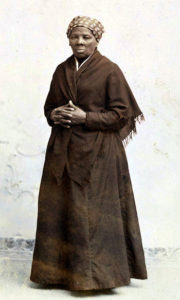
Harriet Tubman
*On this date, we celebrate the birth of Harriet Tubman, a Black abolitionist, in 1820.
Originally named Araminta, or "Minty," Harriet Ross was born on Maryland's eastern shore. She grew up in an area full of wetlands, swamps, and upland forests, giving her the skills she used expertly in her quest for freedom. Her parents were enslaved, and Tubman’s owners rented her out to neighbors as a domestic servant as early as age five. At seven, she was hired out again, and her duties included walking into wet marshes to check muskrat traps. Tubman also worked as a field hand in timber fields with her father and brothers on the north side of the Blackwater River and at piers in the area. All of this helped when, later, as an abolitionist.
In 1844, she married John Tubman, a free Black man. Resolved to escape the horrible conditions of slavery, she tried to convince her husband to join her, but he refused. She fled without him until coming to Pennsylvania, a free state. Tubman was a naturalist who used the call of an owl to alert refugees and freedom seekers that it was OK, or not OK, to continue their journey to freedom. In 1850, she made her first secret trip to Baltimore, where she rescued her enslaved sister and two children. Tubman soon became allied with activists of the Underground Railroad.
In at least 15 trips to the South between 1850 and 1860, she guided around 70 men, women, and children to freedom, including her entire family. In her work, Tubman used medications to quiet crying babies and employed several disguises. After Congress passed the Fugitive Slave Act of 1850, which required Northern states to return escaped slaves, Tubman settled runaways in what is now Ontario, Canada. During the Civil War, with the Union army traveling to South Carolina, she was a liaison between the soldiers and newly freed Blacks, moving them towards self-sufficiency. On the night of June 2, 1863, Tubman guided a troop of 150 black soldiers of the Second South Carolina Battalion on the Combahee River. The plan was to liberate as many slaves as possible by catching slaveholders by surprise. The attack became known as the Combahee River Raid and liberated more than 750 slaves.
Although she got a commendation from officers, she received no pay. After the war, Tubman returned to Auburn to care for her parents. Eventually, she converted her house into a residence for the old and poor. An epileptic, she spent many of her final years working on behalf of women's suffrage. Harriet Tubman, who escaped from slavery and returned to the South repeatedly to lead other African slaves to freedom, died on March 10, 1913.
On April 20, 2016, the U.S. Treasury Department removed Andrew Jackson from the $20.00 bill and replaced him with Harriet Tubman. In 2017, newly elected president Donald Trump reversed the Treasury Department's effort.
Black Women in America An Historical Encyclopedia
Volumes 1 and 2, edited by Darlene Clark Hine
Copyright 1993, Carlson Publishing Inc., Brooklyn, New York
ISBN 0-926019-61-9